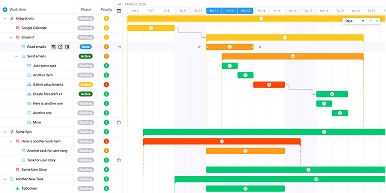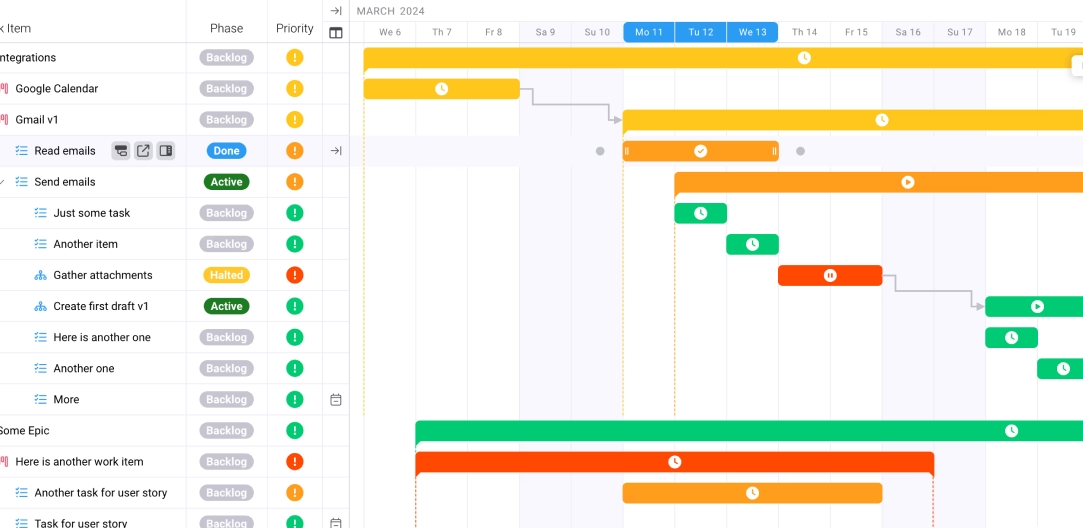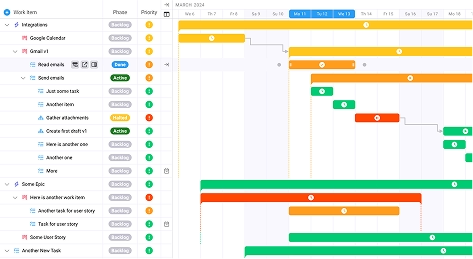
Project Management Software: 23 Must-Have Features for Client Service Businesses
Key takeaways:
- Organizational Impact: Organized marketers are 674% more likely to report success than their peers, demonstrating the direct correlation between structured project management and campaign success
- Resource Optimization: Effective project management systems can reduce campaign failures by up to 90% while improving resource utilization and profitability
- Technology Integration: Modern agencies require specialized tools that integrate project management, resource allocation, and client communication in unified platforms
- Scalable Growth: Proper project management systems enable agencies to scale operations without proportional increases in management overhead
Here’s a stark reality that might make you reconsider your current approach: 97% of agencies faced at least one major campaign challenge in the last year. While creativity remains the lifeblood of marketing agencies, it’s project management for marketing agencies that determines whether brilliant ideas translate into profitable outcomes or expensive failures. The agencies dominating 2025 aren’t necessarily the most creative—they’re the ones that have mastered the intricate balance between innovation and operational excellence through robust project management frameworks.
The Current Challenge: What’s Broken in Agency Project Management
The marketing agency landscape has evolved dramatically, but many project management approaches haven’t kept pace. 40% of agencies list allocating time and billable expenses to projects as their top struggle, revealing fundamental gaps in how agencies manage their most valuable resource: time.
Consider the complexity modern agencies face. With 346,000 marketing agencies worldwide competing for client attention, differentiation increasingly comes down to execution excellence. Yet traditional project management approaches, designed for predictable deliverables, clash with the iterative, creative nature of marketing work.
The challenges compound when agencies juggle multiple clients simultaneously. Unlike internal marketing departments focused on a single brand, agencies must manage diverse client needs, varying approval processes, and constantly shifting priorities. This complexity creates operational bottlenecks that affect both team morale and consistent revenue generation.
Resource allocation presents another critical pain point. Creative work doesn’t follow assembly-line logic, making it difficult to predict exactly how long tasks will take or which team members will be available when needed. This uncertainty creates a ripple effect throughout agency operations, leading to overworked teams, missed deadlines, and eroded client relationships.
Communication breakdowns amplify these operational challenges. When feedback flows through multiple channels—email, phone calls, shared documents, and various messaging platforms—maintaining version control becomes nearly impossible. The result is confusion about which creative assets incorporate the latest feedback, extending review cycles and delaying project completion.
The industry desperately needs modern solutions. Organizations lose millions of dollars to poor project management, making effective project management systems essential for survival. With marketing job demand set to increase by 10% by 2026, agencies that can’t scale efficiently will lose talented professionals to better-organized competitors.
The Strategic Framework: A Modern Approach to Agency Project Management
Successful project management for marketing agencies requires a framework that acknowledges the unique nature of creative work while providing the structure needed for consistent delivery. The most effective approach combines traditional project management principles with agile methodologies tailored specifically for marketing environments.
Foundation: Clear Project Definition and Scope Management
Every successful marketing project begins with crystal-clear scope definition. Research shows that 39% of projects fail due to lack of a project plan and clearly defined project goal, emphasizing the critical importance of upfront planning. This goes beyond listing deliverables to include detailed success metrics, approval hierarchies, and communication protocols.
Project management is essential for modern marketing teams’ success because it provides the structure that allows creativity to flourish within defined boundaries. The scope definition process should involve all key stakeholders from the outset, including both the client and internal team members responsible for execution.
Resource Planning and Allocation Excellence
Effective resource management starts with understanding team capacity at a granular level. This means tracking not just how many hours each team member has available, but also their specific skills, current workload, and peak performance periods. Modern agencies are discovering that utilization rates of 80% or less often produce better results than pushing teams to maximum capacity.
Resource planning must also account for the unpredictable nature of creative work. Building buffer time into project schedules isn’t inefficiency—it’s recognition that breakthrough ideas often require iteration and refinement. The most successful agencies plan for this reality rather than hoping projects will proceed without revisions.
Communication and Feedback Management Systems
Streamlined communication protocols prevent the chaos that often characterizes agency-client relationships. This involves establishing single channels for specific types of communication, creating standardized feedback formats, and implementing clear approval processes that eliminate bottlenecks.
The key is making information easily accessible to everyone who needs it while preventing information overload. Client portal functionality that provides stakeholders with relevant updates without requiring them to dig through detailed project management software represents this balance effectively.
Implementation Tactics: Five Core Strategies That Drive Results
Strategy 1: Deploy Integrated Technology Stacks
Digital agencies need specialized project management software in 2025 that goes beyond basic task management. The ideal technology stack integrates project management, time tracking, resource planning, billing, and client communication in a unified platform.
Integration eliminates the inefficiencies that arise when teams must switch between multiple tools throughout their workday. When project updates automatically flow to time tracking systems, and completed tasks trigger billing processes, agencies can focus on delivery rather than administration.
The technology stack should also facilitate collaboration with external stakeholders. Modern client portal functionality allows clients to access project updates, provide feedback, and approve deliverables without requiring separate communications, dramatically improving project flow.
Strategy 2: Implement Hybrid Agile Methodologies
Traditional agile methods require adaptation for marketing environments. While software development benefits from two-week sprints, marketing campaigns often require longer creative development cycles followed by rapid execution phases. Successful agencies develop hybrid approaches that combine agile principles with marketing-specific timelines.
The sprint concept works well for content creation, social media management, and campaign optimization. However, brand development, major campaign launches, and creative concept development benefit from more traditional waterfall approaches during initial phases, transitioning to agile execution once direction is established.
Understanding that social media is the preferred product discovery channel for Gen Z and Millennials emphasizes how methodology choice should serve creative excellence rather than constrain it. The most effective approach often involves using different methodologies for different project phases or work streams within the same campaign.
Strategy 3: Establish Proactive Resource Forecasting
Advanced resource forecasting involves analyzing historical project data to identify patterns in resource utilization. This includes understanding seasonal fluctuations in client demands, the typical resource requirements for different project types, and individual team member productivity patterns.
Modern resource planning enables agencies to identify potential bottlenecks weeks or months in advance, allowing time to adjust timelines, redistribute work, or bring in additional resources before problems impact project delivery.
Strategy 4: Create Standardized but Flexible Processes
Standardization reduces decision fatigue and ensures consistency across projects, while flexibility allows teams to adapt to unique client requirements. The most successful agencies develop template-based approaches that can be customized for specific situations.
This includes creating standardized project kickoff processes, approval workflows, and delivery procedures that can be modified based on project scope and client preferences. Templates speed initial project setup while ensuring nothing important gets overlooked.
Strategy 5: Implement Continuous Performance Monitoring
Real-time visibility into project performance enables proactive problem-solving rather than reactive crisis management. Key performance indicators should cover both operational metrics (budget variance, timeline adherence, resource utilization) and outcome metrics (client satisfaction, campaign performance, team satisfaction).
Performance data also informs future project planning. By understanding which types of projects consistently run over budget or behind schedule, agencies can adjust their estimation processes and resource allocation strategies.
Measuring Success: KPIs and Metrics That Matter
Effective measurement requires tracking metrics that directly impact both agency profitability and client satisfaction. The most valuable metrics often span multiple dimensions of agency performance.
Financial Performance Indicators
Project profitability remains the ultimate measure of project management effectiveness. This requires tracking not just direct project costs but also overhead allocation and opportunity costs. Projects that come in on budget but consume resources that could have been allocated to higher-value work may actually reduce overall agency profitability.
Utilization rates provide insight into resource efficiency, but must be balanced against quality considerations. Teams operating at maximum utilization often produce lower-quality work and experience higher burnout rates, ultimately reducing long-term productivity.
Cash flow predictability improves when project management systems provide accurate forecasting. Agencies can better manage their financial operations when they can predict when projects will complete and when payments will arrive.
Operational Excellence Metrics
On-time delivery rates indicate how well agencies manage client expectations and internal resources. Consistent delays often signal problems with estimation processes, resource allocation, or scope management.
Scope change frequency and magnitude reveal how effectively agencies define project parameters upfront. While some scope changes are inevitable, excessive changes indicate opportunities to improve initial project planning.
Team satisfaction metrics increasingly matter as agencies compete for talent. High-performing team members who feel overworked or unsupported will seek opportunities elsewhere, creating expensive recruitment and training costs.
Client Relationship Indicators
Client retention rates reflect the cumulative impact of project management on agency-client relationships. Clients who consistently experience smooth project delivery are more likely to expand their agency relationships and provide referrals.
Response time to client communications affects perceived service quality even when final deliverables meet expectations. Fast, professional communication creates positive impressions that can offset minor project hiccups.
Net Promoter Scores specifically related to project management experience help agencies identify areas for improvement that might not surface in general client satisfaction surveys.
Future Considerations: Emerging Trends and Next Steps
The marketing agency landscape continues evolving rapidly, driven by technological advancement and changing client expectations. Agencies must adapt their project management approaches to support increasingly dynamic, real-time marketing environments.
Artificial Intelligence Integration
AI tools are beginning to transform how agencies approach project planning and resource allocation. Predictive analytics can help identify potential project risks before they materialize, while automated scheduling can optimize resource allocation across multiple concurrent projects.
However, AI implementation requires careful consideration of how technology can enhance rather than replace human judgment. The most successful implementations use AI to handle routine optimization tasks while preserving human oversight for strategic decisions.
Enhanced Client Collaboration
Clients increasingly expect real-time access to project information and the ability to provide feedback through streamlined digital processes. Agencies must balance client transparency with team productivity, providing access to relevant information without overwhelming clients with operational details.
The future likely involves more sophisticated CRM and client portal functionality that allows clients to participate in project management processes while maintaining appropriate boundaries around agency internal operations.
Sustainability and Resource Optimization
Growing emphasis on sustainable business practices extends to project management, encouraging agencies to optimize resource utilization and reduce waste. This includes more precise resource forecasting, reduced travel through effective remote collaboration, and digital-first documentation approaches.
These practices often improve profitability while supporting sustainability goals, creating compelling business cases for modernizing project management approaches.
Strategic Leadership Integration
COOs can optimize project management for marketing agency growth by implementing systems that support both operational efficiency and strategic objectives. This involves aligning project management processes with business development goals and long-term agency positioning.
The agencies that thrive in 2025 and beyond will be those that view project management for marketing agencies not as administrative overhead but as a competitive advantage. By implementing robust frameworks that support both creative excellence and operational efficiency, agencies can deliver exceptional client results while building sustainable, profitable businesses.
Success requires recognizing that project management for marketing agencies isn’t about constraining creativity—it’s about creating the structure that allows creativity to flourish consistently and profitably. The frameworks and tools outlined in this guide provide the foundation for that success, but implementation must be tailored to each agency’s unique culture, client base, and growth objectives.
Frequently Asked Questions
What is the best project management methodology for marketing agencies?
There’s no one-size-fits-all approach, but hybrid methodologies that combine agile principles with marketing-specific timelines tend to work best. Consider using agile for iterative work like content creation and traditional approaches for brand development projects.
How can agencies improve resource allocation and prevent team burnout?
Implement realistic utilization targets (around 80%), use predictive forecasting to identify bottlenecks early, and build buffer time into project schedules to accommodate the iterative nature of creative work.
What features should marketing agencies prioritize in project management software?
Look for integrated platforms that combine project management, time tracking, resource planning, billing, and client communication to minimize tool switching and improve workflow efficiency.
How do you measure project management success in creative environments?
Track both financial metrics (profitability, utilization rates) and relationship metrics (client retention, team satisfaction, on-time delivery rates) to get a complete picture of project management effectiveness.
What are the biggest project management challenges facing marketing agencies today?
The top challenges include allocating time and expenses accurately across projects, managing client feedback and approval processes, forecasting resource needs, and maintaining profitable utilization while preventing team burnout.
How can agencies better manage client expectations and scope creep?
Establish clear project scopes upfront with detailed success metrics, implement structured feedback processes, use standardized approval workflows, and maintain transparent communication about any changes that affect timeline or budget.
What role does technology play in modern agency project management?
Technology should integrate multiple business functions to reduce administrative overhead and improve collaboration. The best systems combine project planning, resource management, client communication, and financial tracking in unified platforms.
How do you balance creativity with structured project management processes?
View project management as the framework that enables creativity rather than constrains it. Provide clear boundaries and expectations while allowing flexibility in how creative teams approach problem-solving within those parameters.









